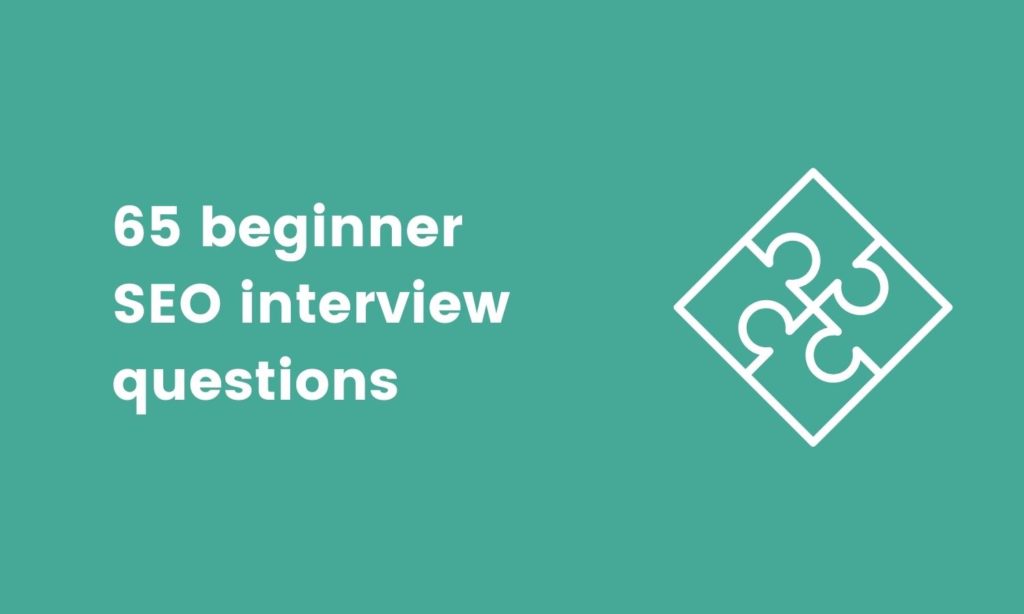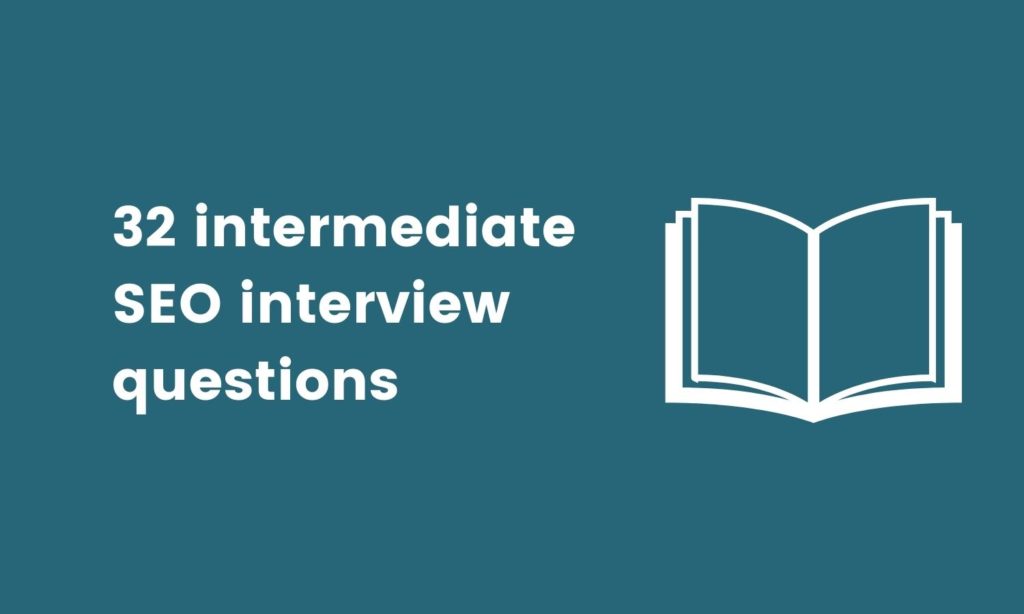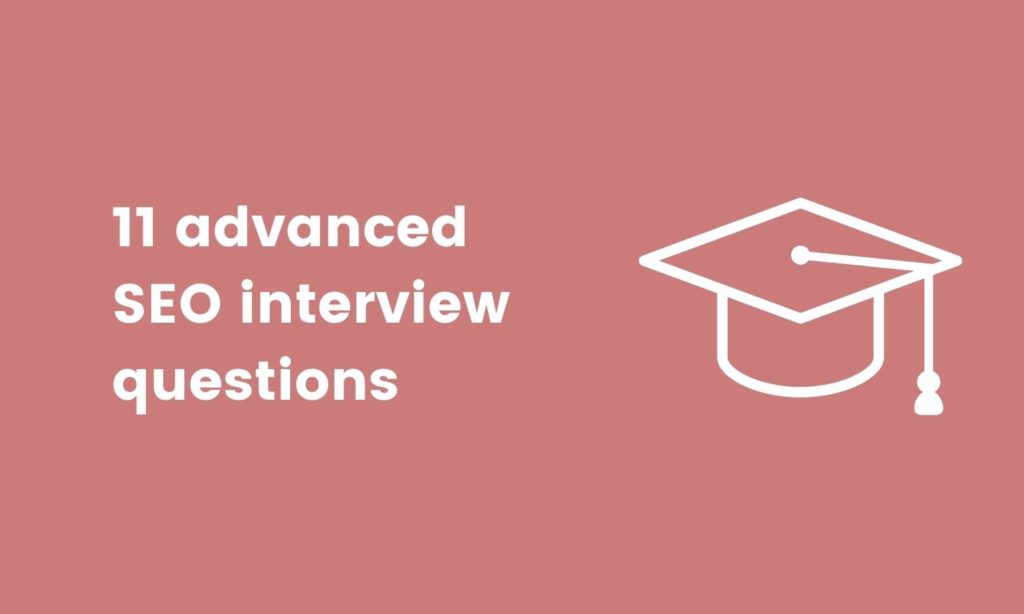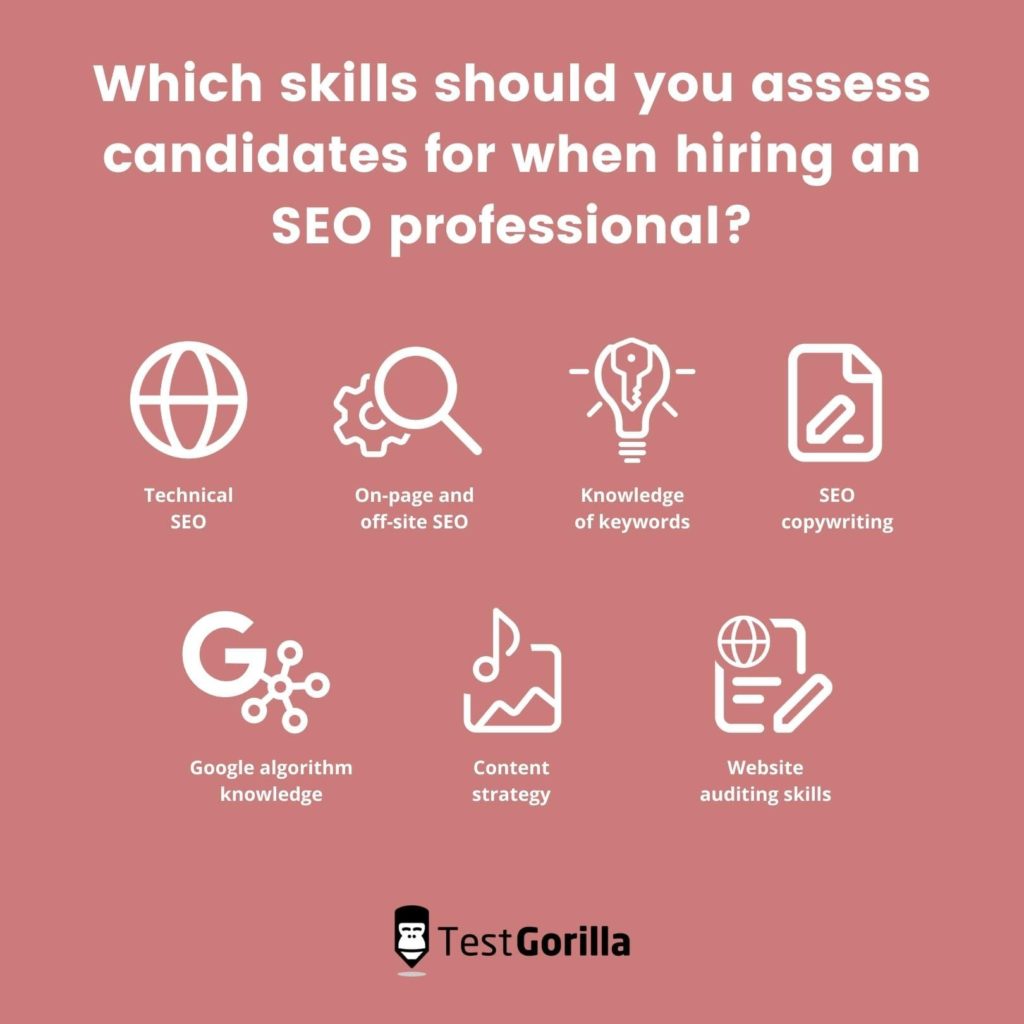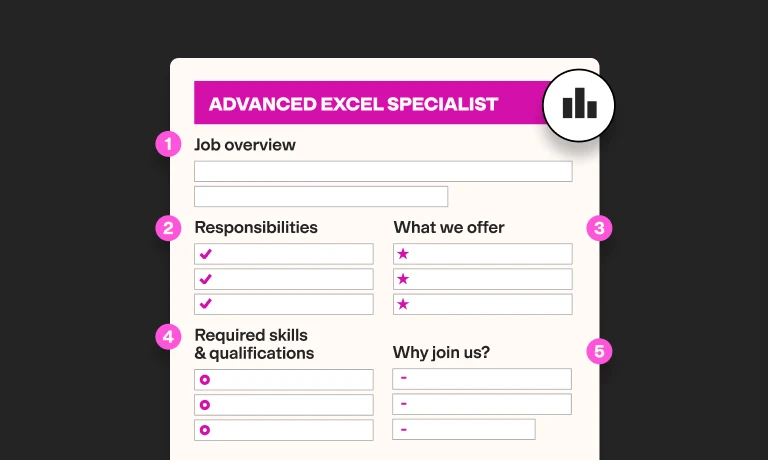100+ SEO interview questions to hire an SEO professional
How critical is SEO for your enterprise?
SEO is one factor that helps organizations and their websites get noticed across the globe.
Having the right SEO professional on your team is vital.
They can increase traffic to your website, ensure potential clients or customers discover your enterprise, or let people know what your organization does through producing engaging content.
Although using an SEO skills test is an important step for assessing SEO applicants, you should also consider the interview stage carefully.
To make the most of these interviews and ensure you hire a professional, ask candidates a selection of SEO questions listed in this article.
Table of contents
- 65 beginner SEO interview questions
- 5 beginner SEO interview questions and the answers to take notice of
- 32 intermediate SEO interview questions
- 5 intermediate SEO interview questions and the answers to listen for
- 11 advanced SEO interview questions
- 5 advanced SEO interview questions and the answers to listen for
- For what kind of roles can you use SEO interview questions?
- Which skills should you assess candidates for when hiring an SEO professional?
- At which stage of the hiring process should you use SEO interview questions
- Find an SEO professional by using skills tests and SEO interview questions
65 beginner SEO interview questions
Here are 65 beginner SEO interview questions to ask candidates who have applied to your SEO open role.
What does SEO mean?
What does SEO help organizations achieve?
Explain what a search engine is.
How important are search engines?
Explain what a domain is.
How many keywords should a webpage have?
Explain what web crawling is.
What is the “People also ask” section of Google?
Explain what autocomplete is in Google.
What are the most popular search engines?
Name six factors that influence Google ranking for content.
Explain what web crawling is.
What does SERP mean?
Explain what organic results are.
Explain what paid results are.
Explain what Google Sandbox is.
What does DA mean?
Why is DA important?
What is PA?
Why is PA important?
How is DA different from PA?
What does TLD mean?
What are some examples of TLDs?
Explain what White Hat SEO is.
Explain what Black Hat SEO is.
How is White Hat SEO different from Black Hat SEO?
Name five Black Hat SEO strategies you should avoid
What is a Private Blog Network?
Name six tools that you use to enhance SEO.
What is the Google Search Console?
What does Google Analytics do?
Explain what a no-follow link is.
Explain what a do-follow link is.
How is a do-follow link different from a no-follow link
What does on-page SEO mean?
Explain what keywords are.
Explain what keyword frequency is.
Explain what keyword difficulty is.
Explain what keyword density is.
Explain what keyword proximity is.
Explain what keyword stuffing is.
Explain what keyword stemming is.
Explain what keyword prominence is.
Explain what a long tail keyword is.
What does bounce rate mean?
What is a header tag?
What is a meta description?
What is an internal link?
What is an outbound link?
What is an inbound link?
Explain how an outbound link is different from an inbound link.
What is an anchor text?
How can anchor text enhance SEO?
What are the characteristics of SEO-friendly URLs?
Explain what an ALT tag is.
What does off-page SEO mean?
What is a backlink?
Why are backlinks important?
Explain what forum posting is.
What is manual blog commenting?
What is automated blog commenting?
How are manual and automated blog commenting different?
Explain what PPC is.
Explain what CTR is.
What is meant by CTA?
5 beginner SEO interview questions and the answers to take notice of
Below are five questions from the beginner SEO interview questions above, along with the answers you should look out for from SEO professionals and candidates
1. What does SEO mean?
The acronym SEO means “search engine optimization.” It combines different strategies that professionals use to increase a website’s traffic from organic search results.
SEO strategies aim to ensure content ranks highly on search engines by using keywords, long tail or LSI keywords, or other approaches.
2. What is meant by CTA?
CTA is an acronym that means “call to action.” This usually features in blog posts to encourage readers to explore the organization’s services or products. Calls to action typically include a verb, aiming to elicit a specific response from the reader.
3. What is a meta description?
Meta descriptions are short descriptions of about 155 characters that summarize and describe the content of a webpage. You can find them under the webpage’s title listed on a search engine results page (SERP). Their main function is to encourage your users to click through to your webpage.
4. Explain what CTR is.
The acronym CTR means “click-through rate.” It is a metric that tracks how many clicks an advertisement receives compared with the total number of times the ad appears.
The higher the percentage of your CTR, the more relevant your advertising is to customers.
5. Explain what PPC is.
The acronym PPC stands for “pay-per-click” advertising. This SEO strategy is used to increase traffic to a website and involves paying a publisher when a client clicks on an organization’s advertisement.
The best insights on HR and recruitment, delivered to your inbox.
Biweekly updates. No spam. Unsubscribe any time.
32 intermediate SEO interview questions
This section features 32 intermediate SEO interview questions you can ask candidates to gauge if their skills meet your requirements.
Which skills are required to implement SEO strategies?
Which soft skills are required to implement SEO strategies?
Explain what canonical URLs are.
Explain what an HTML sitemap is.
What are LSI keywords?
Explain what a Google penalty is.
Name five types of Google penalties.
Name four Google updates and explain their purpose.
What is a rich snippet?
Explain what EAT means.
Why is EAT important for SEO?
Name six ways to reduce the loading time of a website.
Name six Google Analytics reports.
Explain what Google My Business is.
Explain what conversions are.
Explain what competitive analysis is.
Name four social media platforms that enhance SEO performance.
Explain what social signals are.
What does cross linking mean?
How can you determine if a link is bad?
Which is preferable between top-quality content and a high number of backlinks?
What is search intent?
Name some technical best practices when implementing SEO strategies.
What does SEMRush do?
Explain the time-on-page metric.
Explain the dwell time metric.
Which SEO tool is your favorite?
Explain what Google fetch does.
How would you do keyword analysis?
Explain which link types have the most value for SEO.
Explain what Yoast is.
Which resources are ideal for staying up to date on SEO developments?
5 intermediate SEO interview questions and the answers to listen for
Below are five questions selected from the intermediate SEO interview questions above and the answers you should listen for from your SEO applicants
1. Explain what EAT means
EAT is an acronym that means “expertise, authority, and trustworthiness.”
It is the criteria Google uses to determine the quality of a website’s content. Google is more likely to endorse a website if the content shows expert-level knowledge on a topic, is relevant to the user, and is authoritative and trustworthy.
2. What is search intent?
Search intent is used interchangeably with “user intent” or “audience intent.” It refers to the reason why a user runs a search query. In other words, what is the user hoping to learn or find?
3. Name four social media platforms that enhance SEO performance.
Social media platforms that enhance SEO performance include LinkedIn, Twitter, Facebook, and Instagram. Organizations use them to promote content and bolster their SEO strategies.
4. Why is EAT important for SEO?
EAT is an important measure of content quality. Despite not using scores or ratings, EAT is a significant set of criteria that Google uses. If content shows sound EAT principles, Google is likely to rank it more highly.
5. How can you determine if a link is bad?
If a link is not relevant to your written content or comes from a website with low authority, it can be considered a “bad” link. What’s more, if you select several links from one page, or links from websites that have been penalized, they are also considered “bad” links.
11 advanced SEO interview questions
Below, you will find eleven advanced SEO interview questions you can ask candidates during the interview stage.
What does AMP mean?
Explain what Rankbrain is.
Explain what an SEO audit is.
Explain what a link audit is.
Explain what guest posting is.
Name some indicators of a good guest post website.
Which strategy would you use to optimize a website with several pages?
Which actions would you take if a website you worked on was penalized?
Which factors can enhance the quality of a landing page?
Explain what an SEO manager is responsible for.
Explain what an Exact Match Domain is.
5 advanced SEO interview questions and the answers to listen for
This final section features five of the advanced SEO interview questions above and the answers you should listen for from candidates.
1. Explain what an SEO audit is.
An SEO audit involves assessing a website’s overall quality and shows the problems that need fixing. You can assess different parts of the website by using on-page SEO and off-page SEO audits.
2. Explain what a link audit is.
A link audit will assess the quality of your domain’s backlinks. The advantage of a link audit is that it enables you to discover the kinds of backlinks your domain gets. You can also build a disavow list using a link audit to help you disregard backlinks that aren’t valuable or are spam links.
3. Explain what guest posting is.
Guest posting is an SEO activity that makes link building easier. It involves contacting a good-quality website relevant to your content and offering to write content for them. In return, you receive a backlink to your own content and increase your website’s authority.
4. Which factors can enhance the quality of a landing page?
You can use a few key strategies to enhance the quality of a landing page, including:
Writing quality content
Writing original content
Creating easily navigable content
Using imagery
Avoiding excessive use of links
Using calls to action
5. Explain what Rankbrain is.
Rankbrain is a tool that the Google Hummingbird algorithm uses to understand users’ search intent. You can think of it as an artificial intelligence tool that processes pages and determines whether they match the search intent or are suitable matches for user queries.
For what kind of roles can you use SEO interview questions?
As well as digital marketing roles, some of the roles for which our SEO interview questions will be useful include:
SEO copywriting jobs
Marketing manager roles
Marketing editor jobs
SEO specialist positions
Web administrators
HTML and front-end developers
Which skills should you assess candidates for when hiring an SEO professional?
Some of the most important skills that your SEO applicants should demonstrate include: Technical SEO skills, on-page and off-site SEO, knowledge of keywords, SEO copywriting skills, Google algorithm knowledge, content strategy skills, and website auditing skills.
At which stage of the hiring process should you use SEO interview questions
We recommend using our SEO interview questions once your candidates have reviewed your SEO copywriter job description, finished the application process, and completed a skills assessment that features an SEO copywriting skills test or a technical SEO test.
Once you’ve received the test results, you can start narrowing down your candidates to those most suitable for the role.
Invite the candidates who have outperformed all other applicants during the skills testing phase, and use the interview questions listed in this article to dig deeper and learn more about their knowledge.
Find an SEO professional by using skills tests and SEO interview questions
You may encounter challenges when sourcing and assessing the right SEO professionals.
But the right SEO interview questions and SEO skills assessments will make the hiring process simpler and more effective.
Now you’ve got this list of SEO interview questions and a wide range of skills tests available on the TestGorilla platform, you can say goodbye to the most troublesome hiring challenges.
Use TestGorilla’s assessments and our recommended interview questions, and hire the best SEO professionals for your team. Get started for free today and start making better hiring decisions, faster and bias-free.
You've scrolled this far
Why not try TestGorilla for free, and see what happens when you put skills first.


